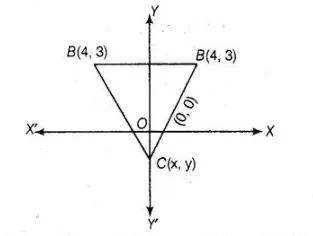If (- 4, 3) and (4, 3) are two vertices of an equilateral triangle, then find the coordinates of the third vertex, given that the origin lies in the interior of the
triangle.
Let the third vertex of an equilateral triangle be $(x, y)$. Let $A(-4,3), B(43)$ and $C(x, y)$.
We know that, in equilateral triangle the angle between two adjacent side is 60 and all three sides are equal.
$\therefore$ $A B=B C=C \cdot A$
$\Rightarrow$ $A B^{2}=B C^{2}=C A^{2}$ ...(i)
Now, taking first two parts.
$A B^{2}=B C^{2}$
$\Rightarrow \quad(4+4)^{2}+(3-3)^{2}=(x-4)^{2}+(y-3)^{2}$
$\Rightarrow \quad 64+0=x^{2}+16-8 x+y^{2}+9-6 y$
$\Rightarrow \quad x^{2}+y^{2}-8 x-6 y=39$
Now, taking first and third parts,
$A B^{2}=C A^{2}$
$\Rightarrow \quad(4+4)^{2}+(3-3)^{2}=(-4-x)^{2}+(3-y)^{2}$
$\Rightarrow \quad 64+0=16+x^{2}+8 x+9+y^{2}-6 y$
$\Rightarrow \quad x^{2}+y^{2}+8 x-6 y=39$...(iii)
On subtracting Eq. (ii) from Eq. (iii), we get

$\Rightarrow$ $x=0$
On subtracting Eq. (ii) from Eq. (iii), we get

$\Rightarrow \quad x=0$
Now, put the value of $x$ in Eq. (ii), we get
$\Rightarrow \quad y^{2}-6 y-39=0$
$\therefore$ $y=\frac{6 \pm \sqrt{(-6)^{2}-4(1)(-39)}}{2 \times 1}$
$\left[\because\right.$ solution of $a x^{2}+b x+c=0$ is $\left.x=\frac{-b \pm \sqrt{b^{2}-4 a c}}{2 a}\right]$
$\Rightarrow$ $y=\frac{6 \pm \sqrt{36+156}}{2}$
$\Rightarrow$ $y=\frac{6 \pm \sqrt{192}}{2}$
$\Rightarrow$ $y=\frac{6 \pm 2 \sqrt{48}}{2}=3 \pm \sqrt{48}$
$\Rightarrow$ $y=3 \pm 4 \sqrt{3}$
$\Rightarrow \quad y=3+4 \sqrt{3}$ or $3-4 \sqrt{3}$
So, the points of third vertex are $(0,3+4 \sqrt{3})$ or $(3-4 \sqrt{3)}$
But given that, the origin lies in the interior of the $\triangle A B C$ and the $x$-coordinate of third vertex is zero. Then, $y$-coordinate of third vertex should be negative.

Hence, the required coordinate of third vertex, $C \equiv(0,3-4 \sqrt{3}) . \quad[\because c \equiv(0,3+4 \sqrt{3})]$
